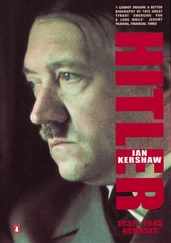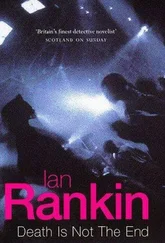He symbolized, of course, an indomitable will to hold onto every inch of territory, never to capitulate. And he could still enthuse those in his presence with the strength of his own will, and with his unquenchable optimism. Hardened military commanders could begin an audience with Hitler sceptically and come out of it reinvigorated. Others, however, were struck by the absence of clear thinking on strategy and tactics. When General Friedrich Hoßbach met Hitler on the evening of 19 July 1944, to be given command of the 4th Army, he saw the Dictator, whose Wehrmacht adjutant he had once been, as ‘bent and prematurely aged’, unable to offer any far-reaching strategic goal and highly superficial in his comments on the tactical position. Hoßbach simply accepted the commission, told Hitler he would act on his judgement when he assessed the situation, and would do his utmost to recover a position lost in the destruction of Army Group Centre. 21
Numerous military commanders had by this time contested Hitler’s decisions to no avail. It was impossible to sustain a reasoned counter-argument in his domineering presence. As supreme leader, he would brook no opposition. His right of command was accepted by all. And those in positions of authority continued to try to implement his orders. But heady rhetoric, and sacking generals for failing to achieve the unachievable, hardly amounted to a strategy, let alone a clearly defined set of aims. In particular, and crucially, he had no exit strategy from the war in which he had embroiled his country. Repelling the Allied invasion, he had once told his military advisers, would be decisive for the war. 22When the invasion proved successful, however, he drew no conclusions, other than to fight on. Outright victory was no longer attainable. Even Hitler could see that. But negotiating with the enemy from a position of weakness could not be entertained for a second. That left fighting on and hoping something would turn up. And that meant playing for time.
Hitler’s military right hand and mouthpiece, General Alfred Jodl, head of the Wehrmacht Operations Staff, reflected the absence of clear strategic goals in addressing his staff on 3 July 1944:
Our own war leadership, on all fronts: focuses now on gaining time. A few months can prove simply decisive for saving the Fatherland…. Our own armaments justify great expectations…. Everything is being prepared, with results in the foreseeable future. So the demand is for fighting, defending, holding, psychological strengthening of troops and leadership. Nail down the front where it now stands. 23
There were many in high positions in the Wehrmacht who shared such a stance. Shoring up stretched defences, holding on, keeping the enemy at bay, rebuilding lines while feverish attempts were made to maximize armaments production, find troop reinforcements and produce new weapons, became ends in themselves, rather than stages on the way to a accomplishment of a preconceived military and political strategy. Colonel-General Heinz Guderian, the redoubtable tank commander, now Inspector-General of Panzer Troops, thus approvingly remarked that, in replacing Field-Marshal Ernst Busch (an ultra-loyalist, but made the scapegoat for grave mistakes in the disaster that had befallen Army Group Centre) by the tough Field-Marshal Walter Model, Hitler had found ‘the best possible man to perform the fantastically difficult task of reconstructing a line in the centre of the Eastern Front’. 24This was, however, not a strategic goal, but merely a ‘fire-fighting’ operation by the man who, for the number of difficult positions he was asked to rescue, became known as ‘Hitler’s fireman’. Most military commanders, whatever their varied level of enthusiasm for Hitler’s regime, acted similarly to Model in doing their utmost to carry out their duties professionally, and with iron discipline, to the limits of their ability and, at least publicly, to ask no questions about political objectives. Those bold enough to voice any views that, however realistic, did not fit the prescribed optimism demanded by Hitler found themselves replaced, as did the highly experienced Commander-in-Chief West, Field-Marshal Gerd von Rundstedt, and the able Commander of Panzer Group West, General Geyr von Schweppenburg, at the beginning of July.
In private, leading Wehrmacht officers were divided in their views on war prospects. Alongside the loyalists, and the front commanders who seldom had the time for lengthy contemplation and, in any case, had little perspective on the overall position, were those whose views on Germany’s military and political prospects were far from rosy. Hitler himself had, for years, castigated the allegedly defeatist and negative attitudes that, in his jaundiced opinion, characterized the General Staff of the Army, responsible for overall operational planning in the east. His mounting and bitter disagreements with the Chief of the General Staff, Franz Halder, had led to the latter’s replacement in September 1942 by the energetic and dynamic Kurt Zeitzler. But, worn out by the constant conflict with Hitler that had reached its climax with the destruction of Army Group Centre, Zeitzler suffered a nervous breakdown at the end of June 1944. He had just told Hitler that the war was militarily lost and that ‘something had to be done to end it’. 25
Zeitzler was expressing a sentiment then widespread within the General Staff, according to a letter composed in his defence by his adjutant, Oberstleutnant Günther Smend, on 1 August 1944. Smend had been arrested for his connection with the Stauffenberg plot and would be sentenced to death on 14 August and executed on 8 September. His letter may well have been preceded by torture and somewhat exaggerated the subversive feeling at General Staff Headquarters. It gives, nevertheless, a clear insight into the mood. Facing almost certain execution, Smend had no obvious reason to dissemble. Doubts about a final victory had mounted, wrote Smend, since the catastrophic defeat at Stalingrad in February 1943. The widening gulf between the recommendations of the General Staff and Hitler’s decisions had given rise to strong criticism of the Führer, notably in the Operations Section, and this had not been dampened by senior officers. Indeed, the head of the section, General Adolf Heusinger, had himself been party to the condemnation of Hitler’s war leadership. 26There was no longer any firm belief in Hitler. The mood in the entire General Staff was one of despair, prompted especially by the disasters in the east but also by the bad news on all fronts, leading to the conclusion that the war was lost. Critical mistakes had been made, and Hitler was seen as a military liability. On the day of his breakdown, Zeitzler had, according to Smend, been blunt in his assessment of the situation in speaking to Hitler. He had recommended the appointment of Himmler as a ‘homeland dictator’ to drive through the total-war effort that had been propagated but not implemented with the necessary rigour. Thereafter, with Zeitzler out of action and the General Staff effectively leaderless for almost a month, the mood grew that ‘the Führer can’t do it’. Opinion hardened that ‘it’s all madness’. Young officers, especially, held Hitler responsible. It was common knowledge, wrote Smend, that ideas of eliminating Hitler were in circulation. 27
On 20 July 1944 such ideas—engendered, adumbrated and elaborated in a conspiracy involving prominent figures in the armed forces, military intelligence, the Foreign Ministry, and other sectors of the regime’s leadership—culminated in the attempt on Hitler’s life undertaken by Count Claus Schenk Graf von Stauffenberg and the subsequent failed coup d’état launched from the headquarters of the Replacement Army in Berlin. Stauffenberg had placed a bomb under Hitler’s table at a military briefing just after noon that day at Führer Headquarters in East Prussia. The bomb had exploded, killing or badly injuring most of those present in the wooden barrack-hut. But Hitler had survived with only minor injuries. Once it had been plainly established that Hitler was alive, support had drained away from the coup planned to follow his presumed death, which collapsed in the course of the evening. Stauffenberg and three other close collaborators were shot by a firing squad late that night. The other plotters were soon rounded up. Most were tortured, subjected to appalling show trials, and then barbarously executed.
Читать дальше












